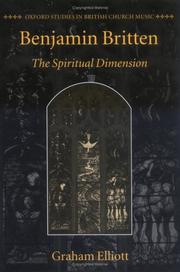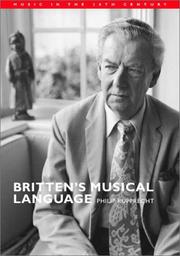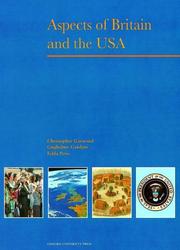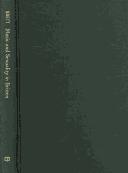| Listing 1 - 10 of 20 | << page >> |
Sort by
|
Book
ISBN: 1443896020 9781443896023 1443886130 9781443886130 Year: 2017 Publisher: Newcastle upon Tyne, England : Cambridge Scholars Publishing,
Abstract | Keywords | Export | Availability | Bookmark
 Loading...
Loading...Choose an application
- Reference Manager
- EndNote
- RefWorks (Direct export to RefWorks)
Coming to terms with Britten's music is no easy task. The complex, often contradictory language associated with Britten's style likely stems from his double interest in progressive composition and immediate connection with a broad, popular audience - an apparent paradox in the splintered musical culture of the 20th century - as well as from complicated truths in his own life, such as his love for a country that accepted neither his sexuality nor his politics. As a result, the attempt to describe his music can tell us as much about our own biases and the inadequacies of our analytic tools as it does about the music itself. Such audits of our scholarly language and strategies are vital in light of the still-murky view we have of twentieth century music. This opportunity for academic self-reflection is the reason Britten studies such as this book are so important. The essays included here challenge assumptions about musical constructs, relationships between text and music, and the influences of age, spirituality, and personal relationships on compositional technique. Part One offers nine essays originally compiled for a symposium designed to recognize the composer's unique and varied contributions to music. The authors include performers, musicologists, and music theorists, and their work will appeal to a wide diversity of readers. The topics and methodologies range from archival research and analysis of text and music to theoretical modelling using techniques such as set theory, metric theory, and prolongation. While the papers were initially conceived in isolation from one another, the collaborative focus of the symposium created opportunities for authors to expose points of intersection. This deliberate reconciliation of lines of inquiry has yielded a more balanced and unified collection of essays than typically found in a simple record of proceedings. Furthermore, the chapters presented here benefit from the wealth of Britten research produced since the 2013 centenary. Part Two provides an account of the symposium performances and lecture recitals that accompanied and enriched the academic presentations. The reader will encounter fully the journey taken by symposium presenters, participants, and attendees by reviewing the concerts, lecture recitals, and papers in the context of the full symposium program.
Britten, Benjamin, --- Britten, Edward Benjamin --- Britten, Benjamin --- Britten, Benjamin E.
Book
ISBN: 0199794863 9780199794867 9780199794805 0199794804 9780199794812 0199794812 Year: 2013 Publisher: Cary : Oxford University Press, USA,
Abstract | Keywords | Export | Availability | Bookmark
 Loading...
Loading...Choose an application
- Reference Manager
- EndNote
- RefWorks (Direct export to RefWorks)

ISBN: 1280755911 0191541710 1423767756 9781423767756 0198162588 9786610755912 6610755914 9780198162582 0198162588 1383007454 Year: 2006 Publisher: Oxford New York Oxford University Press
Abstract | Keywords | Export | Availability | Bookmark
 Loading...
Loading...Choose an application
- Reference Manager
- EndNote
- RefWorks (Direct export to RefWorks)
Graham Elliot examines the importance of 'the things spiritual' in Benjamin Britten's work. He analyses the composer's choice and treatment of subjects and his use of musical influences, especially plainsong, which have a direct association with spirituality.
Church music --- Pastoral music (Sacred) --- Religious music --- Sacred vocal music --- Devotional exercises --- Liturgics --- Music --- Music in churches --- Psalmody --- History and criticism --- Religious aspects --- Christianity --- Britten, Benjamin, --- Analysis, appreciation. --- Religion. --- 78 BRITTEN, BENJAMIN --- 78 BRITTEN, BENJAMIN Muziek--BRITTEN, BENJAMIN --- Muziek--BRITTEN, BENJAMIN --- Britten, Benjamin --- Criticism and interpretation. --- Britten, Edward Benjamin --- Britten, Benjamin E.

ISBN: 0521631548 0521031036 0511088930 1107127971 051117036X 0511066112 051133124X 0511059809 0511482027 1280417455 113914586X 0511068247 9780511482021 9780511066115 9780511068249 9780521631549 9780521031035 9781107127975 9781280417450 9780511059803 Year: 2001 Volume: *17 Publisher: Cambridge ; New York Cambridge University Press
Abstract | Keywords | Export | Availability | Bookmark
 Loading...
Loading...Choose an application
- Reference Manager
- EndNote
- RefWorks (Direct export to RefWorks)
Blending insights from linguistic and social theories of speech, ritual and narrative with music-analytic and historical criticism, Britten's Musical Language offers interesting perspectives on the composer's fusion of verbal and musical utterance in opera and song. It provides close interpretative studies of the major scores (including Peter Grimes, Billy Budd, The Turn of the Screw, War Requiem, Curlew River and Death in Venice) and explores Britten's ability to fashion complex and mysterious symbolic dramas from the interplay of texted song and a wordless discourse of motives and themes. Focusing on the performative and social basis of language, Philip Rupprecht replaces traditional notions of textual 'expression' in opera with the interpretation of topics such as the role of naming and hate speech in Peter Grimes; the disturbance of ritual certainty in the War Requiem; and the codes by which childish 'innocence' is enacted in The Turn of the Screw.
Britten, Benjamin, --- Criticism and interpretation. --- Britten, Benjamin --- -Criticism and interpretation --- Music --- Musique --- History and criticism --- Histoire et critique --- Criticism and interpretation --- Britten, Benjamin, - 1913-1976 - Criticism and interpretation. --- Britten, Edward Benjamin --- Britten, Benjamin E.
Book
ISBN: 9780521194679 9780511978951 9781107507821 9781139568654 1139568655 0511978952 0521194679 1139887807 113957907X 1139573128 1139570463 1139572229 1283716224 1139569562 1107507820 Year: 2012 Publisher: Cambridge ; New York : Cambridge University Press,
Abstract | Keywords | Export | Availability | Bookmark
 Loading...
Loading...Choose an application
- Reference Manager
- EndNote
- RefWorks (Direct export to RefWorks)
Examining the intersections between musical culture and a British project of reconstruction from the 1940s to the early 1960s, this study asks how gestures toward the past negotiated issues of recovery and renewal. In the wake of the Second World War, music became a privileged site for re-enchanting notions of history and community, but musical recourse to the past also raised issues of mourning and loss. How was sound figured as a historical object and as a locus of memory and magic? Wiebe addresses this question using a wide range of sources, from planning documents to journalism, public ceremonial and literature. Its central focus, however, is a set of works by Benjamin Britten that engaged both with the distant musical past and with key episodes of postwar reconstruction, including the Festival of Britain, the Coronation of Elizabeth II and the rebuilding of Coventry Cathedral.
Music --- Reconstruction (1939-1951) --- World War, 1939-1945 --- History and criticism. --- Music and the war. --- Britten, Benjamin, --- Criticism and interpretation. --- Songs and music --- History and criticism --- Britten, Edward Benjamin --- Britten, Benjamin --- Britten, Benjamin E.
Book
Year: 2012 Publisher: Universitätsverlag Göttingen
Abstract | Keywords | Export | Availability | Bookmark
 Loading...
Loading...Choose an application
- Reference Manager
- EndNote
- RefWorks (Direct export to RefWorks)
E. M. Forster first encountered Billy Budd in 1926. Some twenty years later, he embarked on a collaboration with Benjamin Britten and Eric Crozier, adapting Melville's novella for the opera stage. The libretto they produced poignantly reaffirms the Forsterian creed of salvation through personal relationships. This study presents an extensive exploration of Forster's involvement in the interpretation, transformation and re-creation of Melville's text. It situates the story of the Handsome Sailor in the wider context of Forster's literary oeuvre, his life, and his life writings. In detailed readings, Billy Budd becomes a lens through which the themes, patterns and leitmotifs of Forsterian thought and creative imagination are brought into focus. A close re-examination of the libretto sketches serves to shed new light on the collaborative process in which Melville's story was changed to fit an archetypal array of plot and character types that is central to Forster's own storytelling.
Libretto. --- Literature --- History and criticism. --- Melville, Herman, --- Forster, E. M. --- Britten, Benjamin, --- Storytelling --- Opera --- Melville --- Forster --- Britten --- Novella --- Benjamin Britten --- Billy Budd (opera) --- E. M. Forster --- Herman Melville --- Homosexuality --- Libretto
Book
ISBN: 9781139051804 9781107008717 9781461945116 1461945119 1139051806 9781107464759 1107464757 1107008719 1107460573 1139890484 1107458978 1107471850 1107468205 1107472881 1306072220 9781107460577 9781139890489 9781107458970 9781107471856 9781107468207 9781107472884 Year: 2013 Publisher: Cambridge : Cambridge University Press,
Abstract | Keywords | Export | Availability | Bookmark
 Loading...
Loading...Choose an application
- Reference Manager
- EndNote
- RefWorks (Direct export to RefWorks)
The music of Gustav Mahler repeatedly engages with Romantic notions of redemption. This is expressed in a range of gestures and procedures, shifting between affirmative fulfilment and pessimistic negation. In this groundbreaking study, Stephen Downes explores the relationship of this aspect of Mahler's music to the output of Benjamin Britten, Kurt Weill and Hans Werner Henze. Their initial admiration was notably dissonant with the prevailing Zeitgeist - Britten in 1930s England, Weill in 1920s Germany and Henze in 1950s Germany and Italy. Downes argues that Mahler's music struck a profound chord with them because of the powerful manner in which it raises and intensifies dystopian and utopian complexes and probes the question of fulfilment or redemption, an ambition manifest in ambiguous tonal, temporal and formal processes. Comparisons of the ways in which this topic is evoked facilitate new interpretative insights into the music of these four major composers.
Music --- History and criticism --- Britten, Benjamin --- Henze, Hans Werner, --- Mahler, Gustav, --- Weill, Kurt, --- Ṿail, Ḳurṭ, --- Weil, Kurt, --- Weill, Kurt --- וייל, קורט --- Mahler, Gustav --- Maler, Gustav, --- Maler, G. --- Mārā, Gusutafu, --- Henze, Heinz-Werner --- Henze, H. W. --- Criticism and interpretation. --- Influence. --- History and criticism. --- Britten, Benjamin, --- Britten, Edward Benjamin --- Britten, Benjamin E.
Book
ISBN: 022642068X 9780226420684 Year: 2016 Publisher: Chicago The University of Chicago Press
Abstract | Keywords | Export | Availability | Bookmark
 Loading...
Loading...Choose an application
- Reference Manager
- EndNote
- RefWorks (Direct export to RefWorks)
Aging and creativity can seem a particularly fraught relationship for artists, who often face age-related difficulties as their audience's expectations are at a peak. In Four Last Songs, Linda and Michael Hutcheon explore this issue via the late works of some of the world's greatest composers. Giuseppe Verdi (1813-1901), Richard Strauss (1864-1949), Olivier Messiaen (1908-92), and Benjamin Britten (1913-76) all wrote operas late in life, pieces that reveal unique responses to the challenges of growing older. Verdi's Falstaff, his only comedic success, combated Richard Wagner's influence by introducing young Italian composers to a new model of national music. Strauss, on the other hand, struggling with personal and political problems in Nazi Germany, composed the self-reflexive Capriccio, a "life review" of opera and his own legacy. Though it exhausted him physically and emotionally, Messiaen at the age of seventy-five finished his only opera, Saint François d'Assise, which marked the pinnacle of his career. Britten, meanwhile, suffering from heart problems, refused surgery until he had completed his masterpiece, Death in Venice. For all four composers, age, far from sapping their creative power, provided impetus for some of their best accomplishments. With its deft treatment of these composers' final years and works, Four Last Songs provides a valuable look at the challenges-and opportunities-that present themselves as artists grow older.
Composers --- Aging --- Creative ability in old age. --- Psychological aspects. --- Britten, Benjamin, --- Messiaen, Olivier, --- Strauss, Richard, --- Verdi, Giuseppe, --- Last years. --- european history, classical music, performing arts, criticism, creativity, aging, famous artists, giuseppe verdi, richard strauss, olivier messiaen, benjamin britten, operas, falstaff, comedic success, wagner, italian composers, political problems, nazi germany, capriccio, saint francois d assise, death in venice, psychological aspects, creatives, musicology. --- Creative ability in old age --- Psychological aspects --- Britten, Benjamin

ISBN: 0194542459 9780194542456 Year: 1995 Publisher: Oxford Oxford University Press
Abstract | Keywords | Export | Availability | Bookmark
 Loading...
Loading...Choose an application
- Reference Manager
- EndNote
- RefWorks (Direct export to RefWorks)
Amerika --- Amerikanen --- Britten --- Engels --- Geografie --- Geschiedenis --- Groot-Brittannië --- 831 Encyclopedische werken --- Didactics of secundary education --- Didactics of English --- cultuur --- geschiedenis --- Geography --- United Kingdom --- United States

ISBN: 1282771981 9786612771989 0520939123 9780520939127 0520246098 0520246101 9780520246102 9780520246096 Year: 2006 Publisher: CA University of California Press
Abstract | Keywords | Export | Availability | Bookmark
 Loading...
Loading...Choose an application
- Reference Manager
- EndNote
- RefWorks (Direct export to RefWorks)
Philip Brett's groundbreaking writing on Benjamin Britten altered the course of music scholarship in the later twentieth century. This volume is the first to gather in one collection Brett's searching and provocative work on the great British composer. Some of the early essays opened the door to gay studies in music, while the discussions that Brett initiated reinvigorated the study of Britten's work and inspired a generation of scholars to imagine "the new musicology." Addressing urgent questions of how an artist's sexual, cultural, and personal identity feeds into specific musical texts, Brett examines most of Britten's operas as well as his role in the British cultural establishment of the mid-twentieth century. With some of the essays appearing here for the first time, this volume develops a complex understanding of Britten's musical achievement and highlights the many ways that Brett expanded the borders of his field.
Gender identity in music. --- Sex in music. --- Composers --- Britten, Benjamin, --- 20th century. --- benjamin britten. --- british composers. --- british culture. --- cultural history. --- cultural identity. --- essay collection. --- europe. --- famous composers. --- gay studies. --- gender studies. --- lgbtq. --- music and culture. --- music historians. --- music history. --- music scholars. --- music scholarship. --- musical texts. --- musicians. --- musicology. --- nonfiction essays. --- nonfiction. --- operas. --- personal identity. --- queer studies nonfiction. --- queer studies. --- sexual identity. --- sexuality.
| Listing 1 - 10 of 20 | << page >> |
Sort by
|

 Search
Search Feedback
Feedback About UniCat
About UniCat  Help
Help News
News